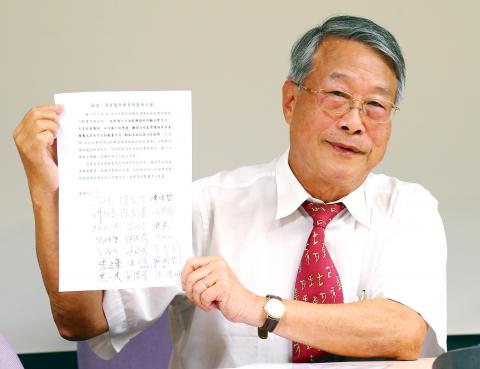A group of Academia Sinica members have signed a petition urging the Ministry of Justice to release former president Chen Shui-bian (陳水扁) from prison on medical parole.
Along with the petition signed by 21 members with a professional medical background, a statement yesterday asked the ministry to respect medical reports from the Tri-Service General hospitals in Greater Taichung and Taipei, that concurred in saying that Chen should receive care at home.
Liao Yun-fan (廖運範), a professor of medicine and former chief resident doctor at National Taiwan University (NTU) Hospital, said a patient’s well-being is a doctor’s foremost consideration.

Photo: CNA
“There should be no political interference. We do not want to see anyone being abused on medical grounds,” Liao said.
The statement cited Chen’s diagnostic report from doctors in May, which said: “The patient should be looked after around the clock by a caregiver... Removing the patient from prison for recuperation and treatment at home can better improve his condition.”
Liao said an NTU Hospital neurologist who saw recent video footage of Chen said that the former president had uncontrollable shaking and difficulty swallowing, which may lead to asphyxiation. The neurologist added that if Chen is not treated soon, he is at high risk of sudden death.
“The ministry had earlier said that they would respect the diagnosis by Tri-Service General Hospital. However, they have not yet done so, which is very disappointing,” Liao said.
Chen Ding-shinn (陳定信), a hepatitis specialist and former head of the NTU College of Medicine, also urged the ministry to respect the diagnoses and for Chen to be released as quickly as possible.
He and Liao led the petition, which was signed by 21 of 31 members of Academia Sinica. Other signatories include former presidents of the National Health Research Institute, Wu Cheng-wen (吳成文) and Wu Kun-yu (伍焜玉).
In response, Chen Shui-bian’s office released a statement to thank Academia Sinica for the petition.
“Our office urges the government to follow its laws, respect the medical profession, conform to the protection of human rights and promptly release former president Chen for him to receive care at home,” the statement said.

Intelligence agents have recorded 510,000 instances of “controversial information” being spread online by the Chinese Communist Party (CCP) so far this year, the National Security Bureau (NSB) said in a report yesterday, as it warned of artificial intelligence (AI) being employed to generate destabilizing misinformation. The bureau submitted a written report to the Legislative Yuan in preparation for National Security Bureau Director-General Tsai Ming-yen’s (蔡明彥) appearance before the Foreign Affairs and National Defense Committee today. The CCP has been using cognitive warfare to divide Taiwanese society by commenting on controversial issues such as Taiwan Semiconductor Manufacturing Co’s (TSMC, 台積電) investments in the

INVESTIGATION: The case is the latest instance of a DPP figure being implicated in an espionage network accused of allegedly leaking information to Chinese intelligence Democratic Progressive Party (DPP) member Ho Jen-chieh (何仁傑) was detained and held incommunicado yesterday on suspicion of spying for China during his tenure as assistant to then-minister of foreign affairs Joseph Wu (吳釗燮). The Taipei District Prosecutors’ Office said Ho was implicated during its investigation into alleged spying activities by former Presidential Office consultant Wu Shang-yu (吳尚雨). Prosecutors said there is reason to believe Ho breached the National Security Act (國家安全法) by leaking classified Ministry of Foreign Affairs information to Chinese intelligence. Following interrogation, prosecutors petitioned the Taipei District Court to detain Ho, citing concerns over potential collusion or tampering of evidence. The

‘COMPREHENSIVE PLAN’: Lin Chia-lung said that the government was ready to talk about a variety of issues, including investment in and purchases from the US The National Stabilization Fund (NSF) yesterday announced that it would step in to staunch stock market losses for the ninth time in the nation’s history. An NSF board meeting, originally scheduled for Monday next week, was moved to yesterday after stocks plummeted in the wake of US President Donald Trump’s announcement of 32 percent tariffs on Taiwan on Wednesday last week. Board members voted to support the stock market with the NT$500 billion (US$15.15 billion) fund, with injections of funds to begin as soon as today. The NSF in 2000 injected NT$120 billion to stabilize stocks, the most ever. The lowest amount it

NEGOTIATIONS: Taiwan has good relations with Washington and the outlook for the negotiations looks promising, Minister of Economic Affairs J.W. Kuo said Taiwan’s GDP growth this year is expected to decrease by 0.43 to 1.61 percentage points due to the effects of US tariffs, National Development Council (NDC) Minister Paul Liu (劉鏡清) said at a meeting of the legislature’s Economics Committee in Taipei yesterday, citing a preliminary estimate by a private research institution. Taiwan’s economy would be significantly affected by the 32 percent “reciprocal” tariffs slapped by the US, which took effect yesterday, Liu said, adding that GDP growth could fall below 3 percent and potentially even dip below 2 percent to 1.53 percent this year. The council has commissioned another institution